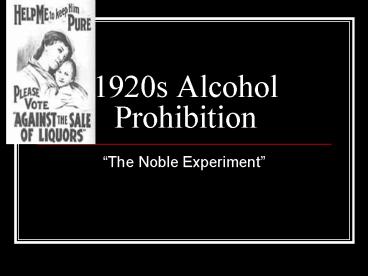1920s Alcohol Prohibition
1 / 25
Title:
1920s Alcohol Prohibition
Description:
The 18th Amendment and Volstead Act took effect in 1920 Prohibited the manufacture, sale, ... 1. 21st Amendment: ratified on Dec. 5, 1933; repealed ... –
Number of Views:282
Avg rating:3.0/5.0
Title: 1920s Alcohol Prohibition
1
1920s Alcohol Prohibition
- The Noble Experiment
2
Questions
- In a time of modernization, urbanization, and
progress, why would the U.S. government start
Prohibition? - Who would support it? Who would oppose it?
3
I. Development of Prohibition
- A. Influences
- 1. The Women's Christian Temperance Union
- 2. Womens suffrage movement
- 3. Progressive Movement reform (i.e. against
alcohol used in voting fraud) - 4. Big Business argued that alcohol consumption
slowed production - 5. Anti-immigration groups argued that immigrants
were spreading the use of alcohol
4
- B. Progression of Prohibition
- 1. In the 1880s, the Prohibition Party was
created - 2. By 1905, three American states had already
outlawed alcohol by 1912, this was up to nine
states and, by 1916, legal prohibition was
already in effect in 26 of the 48 states. - 3. Supported by the anti-German mood of World
War I, the Anti-Saloon League was created in 1918 - 4. The 18th Amendment and Volstead Act took
effect in 1920 - Prohibited the manufacture, sale, or
transportation of intoxicating liquors within,
the importation thereof into, or the exportation
thereof from the United States and all territory
subject to the jurisdiction thereof for beverage
purposes is hereby prohibited.
5
(No Transcript)
6
(No Transcript)
7
II. Effects of Prohibition
- A. Opposition to Prohibition
- 1. organized opposition was small, but grew as
negative social effects became apparent - 2. labor unions and civil liberties activists
organized to repeal the 18th Amendment - 3. As Prohibition became more unpopular,
especially after the beginning of the Great
Depression, people started voting in wet
political candidates.
8
(No Transcript)
9
(No Transcript)
10
- B. Black Market
- 1. Prohibition did not create organized crime,
but it aided their growth in the 1920s - 2. Crime levels in most urban area went up
- 3. Black market speakeasies drove small
businesses out only half reopened after
Prohibition was repealed
11
(No Transcript)
12
(No Transcript)
13
- The St. Valentine's Day massacre was the shooting
of seven people as part of a Prohibition Era
conflict between two powerful criminal gangs in
Chicago, Illinois in the winter of 1929 the
South Side Italian gang led by Al "Scarface"
Capone and the North Side Irish/German gang led
by George 'Bugs' Moran.
14
- C. Law and Order
- 1. Alcohol consumption did decline (dropped to an
average of less then a gallon of alcohol per
person per year, down from two and a half gallons
in 1915) - 2. The underground nature of the black market and
racketeering (cooperation between police and
organized crime) made enforcement difficult - 3. The costs to enforce Prohibition combined
with the loss in taxes made enforcement difficult
15
(No Transcript)
16
(No Transcript)
17
(No Transcript)
18
- D. Prohibition Repealed
- 1. 21st Amendment ratified on Dec. 5, 1933
repealed (canceled out) the 18th Amendment let
states decide - Note 18 states continued to enforce Prohibition
at the state level
19
(No Transcript)
20
Interesting Facts About Prohibition
- While the manufacture, sale, and transport of
alcohol was illegal in the U.S., it was not
illegal in surrounding countries. Distilleries
and breweries in Canada, Mexico, and the
Caribbean flourished as their products were
either consumed by visiting Americans or
illegally imported to the U.S.
21
- The Klan's resurgence in the 1920s partially
stemmed from their role as the extreme militant
wing of the temperance movement. In Arkansas, as
elsewhere, the newly formed Ku Klux Klan marked
bootleggers as one of the groups that needed to
be purged from a morally upright community. In
1922, 200 Klansmen torched saloons that had
sprung up in Union County in the wake of the oil
discovery boom.
22
- Mississippi, which went dry in 1907, was the last
state to repeal prohibition, in 1966.
23
- The first beer legally sold in the United States
after Prohibition was Utica Club of the F.X.
Matt's Brewery in Utica, New York.
24
- Joseph Kennedy, father of John F. Kennedy,
smuggled alcohol from Canada to the U.S. and
built a sizable fortune both during and after
Prohibition.
25
http//www.pbs.org/kenburns/prohibition/photos/






























